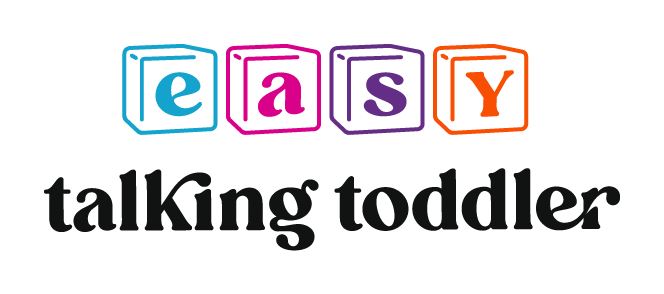If your toddler is showing signs of late talking, you’re likely searching the internet for information on how to help them. As parents, we want to do everything we can to help our children learn and grow. But there is a lot of information out there, and you may have come across some concepts that feel a little foreign, like telegraphic speech. You might be wondering, what is telegraphic speech, and is it something you should pay attention to and focus on with your child?
In this post, we’ll review it in clear, simple terms so you can feel confident about the way you’re supporting your toddler’s language development.

What Is Telegraphic Speech?
Telegraphic speech is the stage of a child’s language development where they speak in simple sentences using mainly verbs and nouns. Their language skills are not yet advanced enough to speak in more complete sentences with function words.
Some examples include “want juice,” instead of “I want juice,” or “doggy bark.”
Their sentences include only the most important words, their words are sometimes in the incorrect order, and the grammatical structure is missing.
This level of their language development is important because it’s through these stages that they begin to learn more and more complete sentences.
The Stages of Telegraphic Speech
I remember with my son, Nico, he went through four stages on his way to talking. First, he started talking with single words, like “mama, papa, wow, and vroom.”
Then he said verbs without subjects, like “go, eat, look, sleep.” Then, “music done”, “lion roar.”
And then from there, sentences that sounded like adult language, such as “I wanna go in,” “I hold it,” or “where are you?.”
These stages before adult language are considered telegraphic speech.
How You Can Help Your Child’s Language Skills
Throughout these stages, children need to eventually learn adult sentence structure, or sentence syntax. Meaning, subject + predicate = sentence.
There are a few different ways you can help them with this at home. Remember, when it comes to learning language, babies and toddlers are picking up on everything you say and learning from every single interaction they have with you.
So here are some things to keep in mind:
Use Specific Labels
Since the first stage is learning single words and labels for things, be specific and label things that you see together.
While your child is playing with their toys, refer to the toys specifically and the objects around them. For example, say, “the baby girl” instead of “she.”
Using descriptive and specific language instead of pronouns is very helpful to your child.
And when you take as many opportunities as you can to name things specifically, you’ll help them start to learn as many different nouns and verbs as possible.
Speak in Simple, but Complete Sentences
Children are constantly observing and picking up on language cues from us. So instead of repeating back to them their one-word sentences, speak in full, yet still simple enough for them to understand, sentences.
For example, while they may say, “want juice,” as you repeat back to them, say the complete version, “you want some juice.”
Gradually Increase Your Sentence Complexity
As their skills grow, it’s important to increase the complexity of the sentences and word choices that you use when speaking to them.
You can repeat back to them with the more complex version of their word or sentence to help their language skills grow.
For example, they may say, “The dog run,” and you may repeat, “Yes, the dog is running fast!’
Modeling the more complex version of what they are saying helps them to build on their language skills.
More Help for Your Child

There are so many things you can do at home to help your child with their speech and language skills. However, if you are concerned that your child’s development seems slower than their peers, it may be time to seek some help.
Talk with your pediatrician, who may recommend a late talker evaluation to help identify what’s going on. This evaluation can help you understand the level of delay your child is experiencing and what specific course of intervention, perhaps through speech therapy, might be best for their needs.
If you are curious about what a late talker evaluation includes, I encourage you to check it out below, or reach out to me via email with any questions that you may have.
Late Talker Evaluation

I’m Guy Garcia. I have successfully treated over 1000 late-talking toddlers, I am a board-certified speech-language pathologist, and I am the founder of Easy Talking Toddler.
